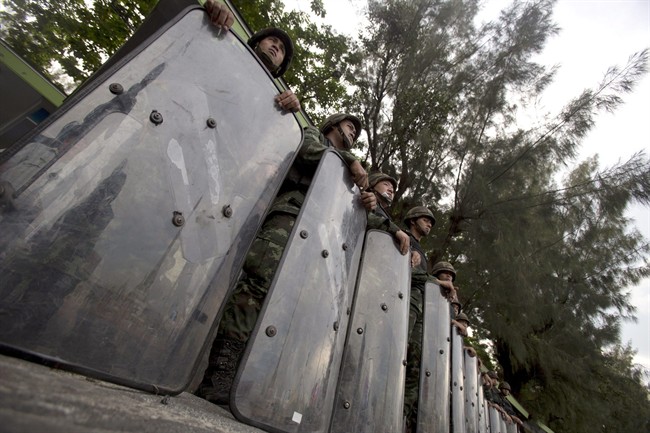WASHINGTON – Thailand’s recent military takeover is more repressive and likely to endure longer than the last military coup eight years ago, a senior U.S. official said Tuesday.

The top diplomat for Southeast Asia, Scot Marciel, voiced concern over censorship of media and the internet and detentions and intimidation of hundreds of political figures, academics, journalists, online commentators and peaceful protesters.
He was testifying at a congressional hearing Tuesday on the threat to democracy in Thailand, the oldest U.S. ally in Asia.
Republican and Democratic lawmakers spoke warmly about Thailand and its alliance with America but voiced support for the Obama administration’s suspension of various assistance and military exercises after a junta took power May 22 following months of protests against the elected government and factional violence.
Marciel said the U.S. wanted to maintain long-term relations with Thailand but it couldn’t be “business as usual” until democracy was restored – a process that took 16 months after the 2006 coup.
“We do not believe that true reconciliation can come about through fear of repression,” he told of a House subcommittee that oversees U.S. foreign policy toward Asia. “The deep-rooted underlying issues and differences of opinion that fuel this division can only be resolved by the people of Thailand through democratic processes.”
The junta, led by army commander Gen. Prayuth Chan-ocha, has characterized the military intervention as necessary to restore order and enact reforms before elections can be held after about 15 months. An interim government is due to be appointed in September.
Marciel described that road map as “quite vague.”
While the coup has been welcomed by many opponents of the toppled elected government of Yingluck Shinawatra, it’s also seen heavy-handed steps to squelch dissent. At the weekend, a man was dragged away by undercover officers for reading a copy of George Orwell’s “Nineteen Eighty-Four” outside one of Bangkok’s most luxurious shopping malls.
Most of the hundreds of detentions have only lasted a few days – and Marciel said the U.S. was not aware of physical mistreatment of those held. But many of those released have had to sign pledges saying they will not instigate unrest.
The European Union on Monday suspended all official visits to and from Thailand and put on hold signing of an agreement to deepen political and business ties. The bloc also suspended talks on a free trade agreement.
Republican Rep. Steve Chabot, who chaired Tuesday’s hearing, said the coup called in question the effectiveness of assistance for Thailand – including about $8 million in military training and financing for sales of defence hardware and services over the past three years – in encouraging democratic values in the nation’s military.
He urged the U.S. to shift the annual Cobra Gold exercise, which is held each year in Thailand and brings together thousands of forces from a half-dozen Asian nations, to another venue, such as Australia. Marciel said no decision had been yet reached on that military drill, which typically takes place in February.
After the 2006 coup, when the U.S. also restricted military assistance, the exercise was still held it in Thailand.
Republican Rep. Dana Rohrabacher said the worst thing that could happen to Thailand was if the military clings onto power, but he and other lawmakers leavened their criticism of the coup with praise for the Southeast Asian nation.
“We expect more from Thailand because they are such a wonderful country,” Chabot said. “We hope that they will in the very near future be in that category again.”

Comments